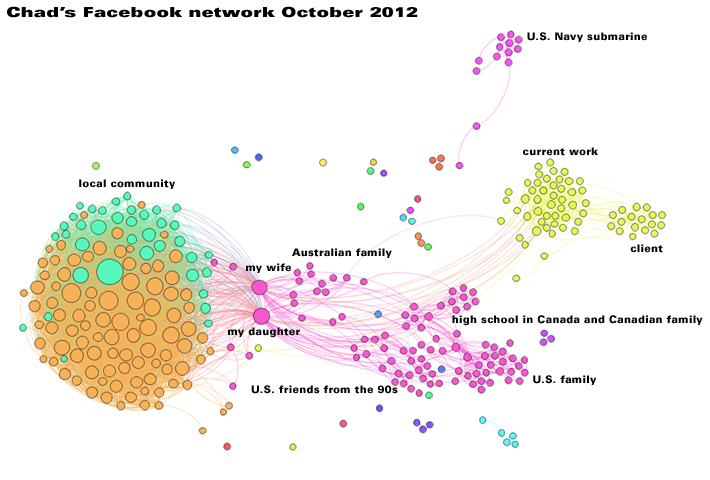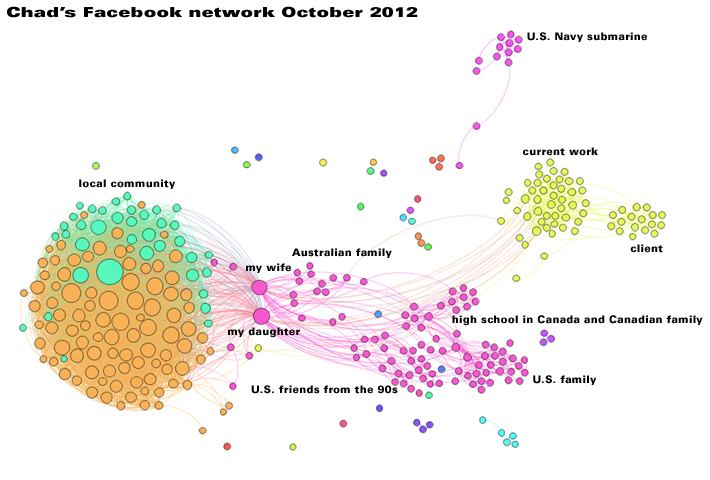Facebook Social Network Analysis with Gephi: MOOC musings on the value of relationships
A Coursera MOOC primer on Social Network Analysis

I’m taking the free online Coursera course for Social Network Analysis out of interest in the topic and to explore the massive open online course (MOOC) movement that is challenging traditional learning institutions. MOOCs provide free and equitable access to education and personalise the education path relative to individual aspirations. The demand is significant, with this one course alone attracting 21,000 active students.
The first week of the course offered a primer on social network analysis, which maps relationships between people or actors and allows for observations based on their connections. For example, social network analysis can be applied in areas such as:
- Team-based organisations: Who are the main influencers who affect behaviour change?
- Computer networks: What networks need to be isolated to stop a virus from spreading to everyone?
- Community groups: Who is the “fringe” that can act as a catalyst for innovation?
- Illicit drug networks: Who are the main points of distribution?
- Community disaster recovery: Which support organisations have the greatest capacity to reach the most people?
- Project management: Where are the information flow bottlenecks?
- Marketing: Which consumer segments have the most influence?
As an introduction, the course had students download their Facebook network as a gml file using the app getnet based on netvizz and analyse the results with gephi. If that all sounds confusing, there is a good tutorial here that will walk you through the process if you are keen.
LinkedIn proposes to offer a similar feature to analyse your LinkedIn connections using their inmaps tool. Unfortunately, the page failed to load for my 311 connections. The value in the LinkedIn application is to determine who the primary influencers are in my business network.
My network

After playing with the data from my 357 Facebook friends, I ended up with the output you see above. The results look like an ice cream cone on its side or one of those spider robots from the Matrix.
At the big blob on the left, you can see my local community, largely revolving around my church. You can see two distinct segments in the organisation, with the big green dot of a pastor acting as a common point.
Moving to the right of the blob, my wife and daughter stand out as primary influencers in my network. They share connections with my family and friends in Australia and my past in the United States and Canada. You can see some linking family members between my U.S. family and my high school friends when I lived with Canadian relatives from grade ten onwards.
In the yellow you can see my current employment, which I have worked at as long as Facebook has been around. You can also see a dominant client hanging off the side with a few connections to internal staff. My shipmates from my U.S. Submarine days are hanging out unconnected, along with a couple dozen unconnected people I have picked up along the way.
The importance of relationship
Social network analysis has value in organisations. By mapping individuals who have a greater number of connections, you can determine those who are key champions for change initiatives. You can also identify sub-networks that can act as innovation centres within the organisation. Unless you operate your business in Facebook, this will require some way to extract your networks from your operational systems in a format that software like Gephi can understand.
For the most part from a personal application, this analysis is just an interesting exercise. I am not going to change anything in my life as a result of seeing my sideways ice cream cone, apart from being aware that my wife and daughter are appropriately at the centre of my network and that I need to treat them accordingly.
We are becoming increasingly connected, some more than others. Rather than six degrees of separation, Facebook says the number of connections between people is down to 4.74.
Our attention spans are decreasing and we are becoming an increasingly disposable society. As the number of connections between people decrease, there are more paths to reach the same goal. This means relationships can become disposable, cast aside when what is perceived as a better network connection becomes available. The risk of social network analysis is that it can prescribe a utilitarian view of people, who are reduced to nodes of necessity.
Alternatively, social network analysis can be used to highlight that our networks our fragile, held together only by the strength of our relationships. Breaking one tie can have a significant effect that leaves many “orphans”. It may also be necessary to intentionally sever one or two relationships to isolate unhealthy networks.
Social network analysis is a technical approach to taking care of our relationships and communities. If it takes pretty graphs to help us do that in our increasingly fragmented society, then social network analysis may become a mandatory course for life.


changed my mind, it’s less an ice-cream blob and more like a pastel jellyfish
Chad, simply brilliant! Re-framing the way we take care of our social network using Gephi. who’d a thunk it 🙂 Well done!
“Alternatively, social network analysis can be used to highlight that our networks our fragile, held together only by the strength of our relationships. Breaking one tie can have a significant effect that leaves many “orphans”. It may also be necessary to intentionally sever one or two relationships to isolate unhealthy networks.”
one perceived problem when a marriage/LTR breaks down is who in the couple owns the friends? Ultimately that’s an artificial constraint from people overthinking the situation, or playing power games. Ultimately we have personal relationships with people because of the value they have in our lives and of us in theirs, not “connections” to nodes on a (unhealthy or otherwise) network.
An experiment: pick up the phone and actually talk to your network nodes, Chad. Leave Facebook and email alone for a while and experience the difference. Less efficient, sure, but potentially more meaningful.
My 2c. YMMV
Hi Barry,
Sounds like coffee is definitely in order.
Ring, ring, let’s node it up! 🙂
Chad
Hey this is a nice analysis.
Can you please let me know how can I download my facebook network in form of gml file for analysis using Gephi?
Thanks.
Thanks for your question!
There is a great tutorial here: http://blog.ouseful.info/?s=gephi+facebook&order=ASC which points you to the Netvizz Facebook app.
Chad